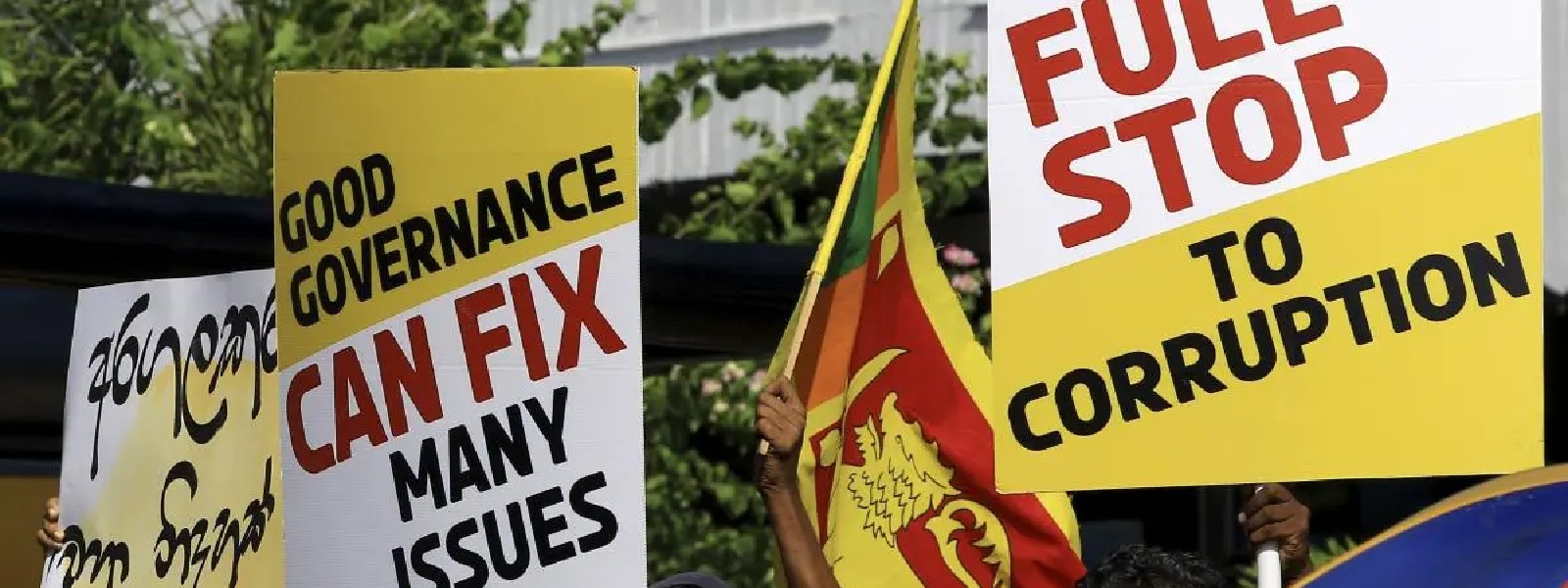.webp)

IMF GDA points out systematic & severe governance weaknesses
COLOMBO (News 1st); The Sri Lanka Governance Diagnostic Assessment September 2023 by the IMF mission has revealed that social tensions remain high in the island nation due to falling real incomes.
This is despite tentative signs of macroeconomic stabilization with inflation moderating, exchange rate stabilizing, and the Central Bank of Sri Lanka (CBSL) rebuilding reserves buffers.
It adds that the government measures to address the balance of payment crisis, including tax reforms and cost-recovery pricing in the energy sector, have raised the cost of living.
The Diagnostic Assessment noted that the continued shortages of essentials, strong-arm measures against protestors, and the postponement of local government elections have been sources of popular discontent.
It goes on to note that large fiscal deficit and elevated debt continued to weigh on the recovery prospects.
The Diagnostic Assessment reveals that the absence of visible progress on addressing corruption and holding officials to account for past behaviour raises popular concerns that vfficials will continue to enjoy impunity for their misconduct.
The GDA revealed systematic and severe governance weaknesses and corruption vulnerabilities across state functions, with particular macroeconomic impact in: budget credibility; expenditure control; public investment management and control of spending); public procurement; management and oversight of State-Owned Enterprises (SOEs); transparency of revenue policy and the integrity of revenue administration; the governance and legal frameworks of the Central Bank; the application of financial sector regulations; and clarity and security of land ownership and the integrity of the judicial sector.
Corruption vulnerabilities are exacerbated by weak accountability institutions, including the Commission to Investigate Allegations of Bribery and Corruption (CIABOC) that have neither the authority nor competency to successfully fulfil their functions.
The GDA points out that impunity for misbehaviour enjoyed by officials undermines trust in the public sector and compounds concerns over limited access to efficient and rule-based adjudication process for resolving disputes.
It noted that Corruption vulnerabilities in Public Procurement remain high, and the absence of a public procurement law creates ambiguity in the legal framework, and has contributed to high-levels of political engagement in the selection of procurement winners, poor contract management, limited transparency and a lack of oversight of procurement processes and outcomes.
The GDA has made 16 Priority Recommendations for Sri Lanka.
1. By November 2023, establish an Advisory Committee, composed of independent experts on anticorruption to assist in the nomination of CIABOC Commissioners and the Director General.
2. Publication of Asset Declarations for senior officials (President, Prime Minister, ministers) on a designated website in line with Anticorruption Law by July 2024
3. Enact Proceeds of Crime legislation that is fully aligned with UNCAC and FATF standards by April 2024.
4. Amend the National Audit Act to enable the Auditor General to levy surcharges on officers, including Chief Accounting Officers, for failure to properly discharge responsibility for oversight and accountability for use of public resources.
5. Finalise and implement regulations to support the provision of beneficial ownership information as required by the Companies Act and establish a public beneficial ownership registry by April 2024.
6. Enact a Public Procurement Law that reflects international good practice by December 2024.
7. In December 2024, publish report on a designated website on progress in increasing the proportion of competitive tendered procurement contracts in the 10 agencies determined to have the lowest level of competitive tenders in 2022.
8. Starting in March 2024, publish on a designated website:
(i) all public procurement contracts above LKR 1 billion, along with comprehensive information in a searchable format on contract award winners;
(ii) a list of all firms receiving tax exemptions through the Board of Investment and the SDP, and an estimation of the value of the tax exemption; and
(iii) a list of firms receiving tax exemptions on luxury vehicle import. Information to be updated every 6 months.
9. Implement the SOE Reform Policy, ensuring that the holding company (HoCo) and the advisory committee are comprised of skilled, independent, and ethical staff.
10. Abolish or suspend application of the Strategic Development Projects Act until promulgation of explicit and transparent process for evaluation of proposals and costing of investment promotion conditions.
11. Amend tax legislation to eliminate or restrict ministerial authority to introduce tax changes without prior parliamentary approval and ensure that such changes do not generate revenue losses
12. Institute short-term anti-corruption measures within each revenue department to strengthen internal oversight and sanctioning processes and linkages with CIABOC and related criminal investigation and enforcement processes by Dec 2023 and issue a public report on steps taken and results obtained by Dec 2024.
13. Following a broad consultative process, produce a Cabinet policy paper by June 2024 on options for establishing new management arrangements for the Employee Provident Fund that terminates direct CBSL management.
14. Revise legislation, regulations, and process relating to financial sector oversight in the banking sector, including strengthening corporate governance for banks with government ownership by improving the selection of executives and Board members
15. By December 2024, establish an on-line digital land registry, and publish, on a designated website, report on progress in implementing published Plan for registering/titling all state land.
16. Establish and implement a plan to expand the resources and skills available to the Judicial Services Commission in order to enhance their ability to carry out their function and define potential options for modifying governance arrangements in the Justice sector to strengthen oversight, monitoring, and proper sector development.
Other Articles
Featured News





.png )





-755421-755635_550x300.jpg)



-755617_550x300.jpg)
-755574_550x300.jpg)
.gif)








.webp)






